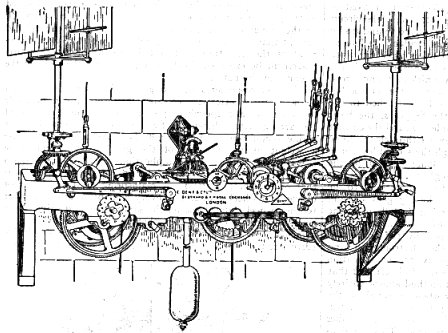Unneeded Clocks
Today, clocks tell us more than just the time of day. The University of Houston's College of Engineering presents this series about the machines that make our civilization run, and the people whose ingenuity created them.
The mechanical clock was invented around AD 1300 -- give or take a little. Two hundred and fifty years later, clocks had become very sophisticated machines. Otto Mayr's book on the third century of clock-making, The Clockwork Universe: 1550 to 1650, provides a remarkable insight, not just into the glorious clocks of that period, but into the nature of invention as well.
The invention of the mechanical clock introduced something new among machines. You wind up a clock and then sit back to watch it carry out its function. A well-designed clock goes on and on, showing the time of day without human intervention and without self-correction. For that reason, the ideal clock -- the clock that we almost, but never quite, make -- soon became a metaphor for divine perfection.
By the mid sixteenth century, clocks weren't just accurate; they were also remarkably beautiful -- adorned with stunning, but seemingly useless, mechanical trimming. Robots marched out on the hour and performed short plays. Extra dials displayed the movements of planets. Makers crowned their clocks with exquisite miniature gold, bronze, and silver statuary.
Were not the intricate wheels and gears of these Baroque clocks like the solar system itself -- or the universe, or the mind of man, or the nature of God! The best minds and talents were drawn into the seemingly decorative work of clock-making just because clocks had so harnessed the imagination of 16th-century Europe.
All this was rather strange: there was no need for precision time-keeping. The clock wouldn't assert its role as a scientific instrument until much later, during the eighteenth century. The need for keeping track of longitude -- for comparing the midnight heavens in the West Indies with those in London -- would eventually give clock-making a terribly urgent role in human affairs.
But in 1600 the clock was still an esthetic and intellectual exercise. In our functional thinking today, we probably would condemn all that kingly clock-making as a very poor use of government resources. Yet the stimulus of the clock eventually drove us to unimagined levels of quality in instrument-making. It drove and focused philosophical thinking.
In the end, the precision of this not-so-frivolous high technology was a cornerstone for seventeenth-century scientific revolution, for eighteenth-century rationalism, and (at length) for the industrial and political revolution that brought in the nineteenth century.
Still, it was the work of technologists and patrons who danced to impractical ends -- people who were simply having fun. Those are the people who really change their world. And, make no mistake, those Baroque clock-makers had a whole lot of fun.
I'm John Lienhard, at the University of Houston, where we're interested in the way inventive minds work.
(Theme music)
Maurice, K. and Mayr, O., The Clockwork Universe: German Clocks and Automata. Washington, D.C.: The Smithsonian Institution and New York: Neal Watson Academic Publishers, 1980.
This is a revised version of Episode 46.

An old tower clock from Hidalgo, Mexico. This
Baroque-style mechanism drives four eight-foot dials.
From the 1911 Enclopaedia Britannica